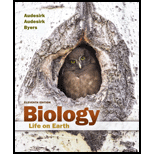
Concept explainers
Which of the following statements about protists is False?
a. Some protists are photosynthetic.
b. All protists are eukaryotes.
c. Although protists are diverse, they form a single clade.
d. Protists include both unicellular and multicellular species.
Introduction:
Bacteria, archaea, and eukaryotes are the three domains of life. The eukaryotes consist of plant, animals, and fungi. However, there are certain eukaryotes that do not fall in these three groups. They are collectively known as protists.
Answer to Problem 1MC
Correct answer:
The false statement from the given statements is that although the protists are diverse, they form a single clade.
Explanation of Solution
Explanation for the correct answer:
Option (c) is given that, although protists are diverse, they form a single clade is false about protists. A clade can be defined as a group consists of all the decedents of a particular common ancestor. The protists do not have a common ancestor. All the protists are not even related. Protist is a term coined by systematics to help them catalog the organisms that do not fall in specific eukaryotes types. Thus, the protists do not form a single clade. Hence, option (c) is a correct answer.
Explanation for the incorrect answers:
Option (a) is given that some protists are photosynthetic is false about protists. However, protists gain nutrition by different processes like nutrient absorption from the surroundings, ingestion of food, and capturing solar energy through the process of photosynthesis. The example of photosynthetic protist is Caulerpa. So, it is an incorrect option.
Option (b) is given that all protists are eukaryotes, is false about protists. Of the life’s three domains, only bacteria and archaea are prokaryotes. All protists are eukaryotes; however, they do not fall in plant, animal, or fungi categories. So, it is an incorrect option.
Option (d) is given that protists include both unicellular and multicellular species is false about protists. Most of the protists are unicellular and so, they are usually invisible; however, there are some multicellular protists that are physiologically and structurally complex. So, it is an incorrect option.
Hence, options (a), (b), and (d) are incorrect.
Therefore, it can be concluded that although the protists are diverse, they do not form a single clade. This is because they do not have a single ancestor.
Want to see more full solutions like this?
Chapter 21 Solutions
Biology: Life on Earth (11th Edition)
- 4.arrow_forward2arrow_forward1. 2. 3. Marine fish cells are hypotonic compared to their seawater environment; their cells lose water by osmosis and gain solutes. If you add heterotrophic respiration and autotrophic respiration together and then subtract that value from gross primary productivity, then you have a more refined estimate of ecosystem carbon storage than NEE. Differential heating due to the earth's tilt generates the global wind AND oceanic circulation patternsarrow_forward
- KD 200- 116- 66- Vec ATF6 (670) ATF6 (402) ATF6 (373) ATF6 (366) I I 45- 1 2 3 4 5 ATFG (360) (e/c) 9V ATFG (402) g ant- ATF anti-KDEL DAPI barrow_forwardWestern blot results: what information can you get? Presence of proteins of your interest Levels of protein expression Levels of protein activation (must use activation state-specific antibody) Decreased function of the ATM kinase in aging mice. A C57BL/6 female 6 month Con IR 20 month C57BL/6 male 6 month 28 month Con IR Con IR Con IR p-ATM (S1981) ATM P-p53 (ser18) Actinarrow_forwardDoes it show the level of proteins? What about the amount? Levels of protein activation? How can you tell? Does the thickness tell you anything? What about the number of the lines?arrow_forward
 Biology (MindTap Course List)BiologyISBN:9781337392938Author:Eldra Solomon, Charles Martin, Diana W. Martin, Linda R. BergPublisher:Cengage Learning
Biology (MindTap Course List)BiologyISBN:9781337392938Author:Eldra Solomon, Charles Martin, Diana W. Martin, Linda R. BergPublisher:Cengage Learning
 Concepts of BiologyBiologyISBN:9781938168116Author:Samantha Fowler, Rebecca Roush, James WisePublisher:OpenStax College
Concepts of BiologyBiologyISBN:9781938168116Author:Samantha Fowler, Rebecca Roush, James WisePublisher:OpenStax College Biology: The Dynamic Science (MindTap Course List)BiologyISBN:9781305389892Author:Peter J. Russell, Paul E. Hertz, Beverly McMillanPublisher:Cengage Learning
Biology: The Dynamic Science (MindTap Course List)BiologyISBN:9781305389892Author:Peter J. Russell, Paul E. Hertz, Beverly McMillanPublisher:Cengage Learning Biology 2eBiologyISBN:9781947172517Author:Matthew Douglas, Jung Choi, Mary Ann ClarkPublisher:OpenStax
Biology 2eBiologyISBN:9781947172517Author:Matthew Douglas, Jung Choi, Mary Ann ClarkPublisher:OpenStax Biology Today and Tomorrow without Physiology (Mi...BiologyISBN:9781305117396Author:Cecie Starr, Christine Evers, Lisa StarrPublisher:Cengage Learning
Biology Today and Tomorrow without Physiology (Mi...BiologyISBN:9781305117396Author:Cecie Starr, Christine Evers, Lisa StarrPublisher:Cengage Learning





